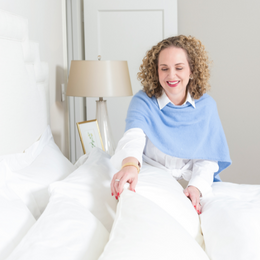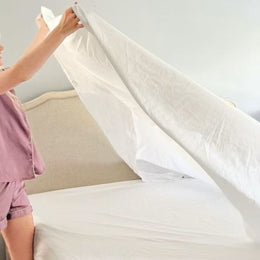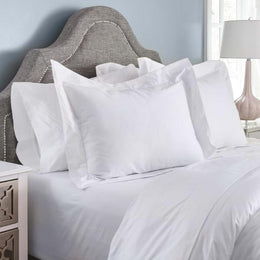Chances are, when you crawl into your warm, comfy bed tonight, you will find the position that makes you the most comfortable and tends to help you drift off to slumberland. But did you know that the position that you sleep in can impact the quality of rest that you get, as well as be responsible for some of the health issues that you may encounter?
Side Sleepers
The majority of sleepers choose to sleep on their side, with the most popular position being the fetal position. In fact, nearly 40% of us sleep in the fetal position, with the majority being women. There are many advantages to sleeping on your side:
- Side sleeping seems to provide comfort and relief to back pain sufferers by reducing pressure on the back.
- Obstructive sleep apnea often goes hand in hand with snoring. These sleep maladies can be lessened with side sleeping.
- Acid reflux and heartburn can be minimized by sleeping on your side as opposed to sleeping on your back.
- Pregnant women find sleeping on their side not only comfortable, but also find relief from acid reflux.
Though there are many advantages to sleeping on your side, there are a few disadvantages.
- Though sleeping on your side is generally good for your back, some arthritis sufferers may encounter stiffness, particularly if laying in one position for an extended time.
- If you sleep on your side, you may notice marks from your pillow when you get up in the morning. Over time, sleeping on your side causes your face to be pushed down into the pillow, and you may start to notice looseness or wrinkling.
The pros to side sleeping clearly outnumber the cons. If you are concerned with wrinkles brought on from sleeping on your side, try a
silk pillowcase. Silk is an all natural product that allows both skin and hair to lay smoothly on the pillow.
Back Sleepers
Sleeping on your back is not the most popular position. It does, however offer the most health benefits, particularly as we age.
- Back sleeping is easy on the spine, and helps to relieve knee and hip pain.
- It offers a natural alignment of the head, neck, and spine, thus reducing neck pain and strain.
- Some back sleepers claim that acid reflux is reduced if they sleep on their back with their head elevated with a pillow.
- Since gravity is an enemy of your skin, sleeping on your back helps to reduce wrinkling.
Many people who might prefer to sleep on their backs, avoid doing so simply because of snoring and sleep apnea. Sleeping on your back can cause airway blockage and can make it harder to breathe. And avoid back sleeping if pregnant, particularly in the third trimester, since it is said to reduce blood flow to the fetus.
Stomach Sleepers
Sleeping on your stomach is an unpopular position as well. The reason for this, primarily, is that sleeping on your stomach or prone sleeping, puts pressure on your internal organs as well as your breathing. One positive that stomach sleepers realize is that they do not have an issue with snoring. The list of reasons not to sleep on your stomach, however is lengthier.
- Sleeping in the prone position causes strain to your joints and muscles.
- People who sleep on their stomachs often experience neck and back pain.
- Your face is smashed into your pillow, so you will start to see wrinkles appear.
- You may experience tossing and turning or even muscle cramps due to your position.
Getting Your Best Sleep
If you are sleeping in a position that has some disadvantages, there are some things that you can do:
- Use pillows to alleviate strain on joints. Place a pillow under your knees so that your spine is aligned correctly if you are sleeping on your back. If you are sleeping on your side, place a pillow under your neck so that you don't awake with a sore neck or shoulder. Use a silk pillowcase to minimize wrinkles.
- Make sure your bedroom is set up for sleeping. Clean, natural, percale sheets, an uncluttered room free of distractions, and a set bedtime routine will help you get your best rest.
- Be sure that your mattress is comfortable and not past its shelf life. A mattress pad can add to a comfortable night's sleep.
- Try to alter your sleep position. If you are sleeping in a position that is leaving you with discomfort or worse, try switching to another position. However, if you are sleeping comfortably in a position and are experiencing no drawbacks, why change?
We want you to have your best sleep ever. If you have any questions about our wide range of luxury bedding products,
contact us today!




